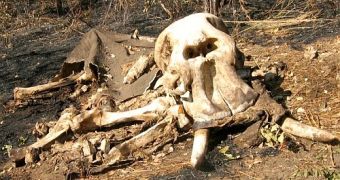Recent news from Central Africa says that, in just eight years' time (i.e. between 2004 - 2012), Gabon's Minkebe National Park was “drained” of over 11,000 elephants by poachers whose only goal was that of collecting these animals' tusks and selling them on the black market.
Needless to say, concerns are now being raised with respect to the species' survival chances in this part of the world.
More precisely, several conservationists fear that, unless these killings are put an end to as soon as possible, Central Africa might one day wake up to find that elephants had fallen of the local biodiversity map.
The World Wildlife Fund informs us that, when taking into consideration the overall headcount for Central Africa's elephants, said over 11,000 deaths amount to 44%-77% of the species' entire population.
According to the same source, the poachers carrying out these animal slaughters are doing no more and no less than taking advantage of the fact that the Central African Republic is still experiencing some political instability.
Thus, conservationist Guian Zokoe wished to make it quite clear that, “The Central African Republic’s new government has to send its armed forces to stop these poachers before they hit its last elephant stronghold.”
“It is not just a question of protecting CAR’s natural resources, but of stopping these armed groups from waltzing around the country and terrorizing local populations wherever they go,” Guian Zokoe went on to add.
Besides taking such measures, efforts must be made towards curbing the global ivory demand, the World Wildlife Fund explains.
In order for this to happen, countries worldwide must accept the idea that poaching constitutes a threat to international security and present a united front against it.
“The international intelligence community needs to get involved in this fight as soon as possible, in order to identify, track and put out of business these global criminal networks, which corrupt governments, erode national security and hamper economic development prospects,” argued Bas Huijbregts, member of the World Wildlife Fund.

 14 DAY TRIAL //
14 DAY TRIAL //